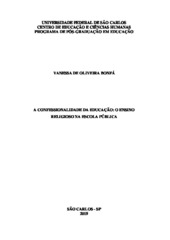| dc.contributor.author | Bonfá, Vanessa de Oliveira | |
| dc.date.accessioned | 2019-05-03T13:56:54Z | |
| dc.date.available | 2019-05-03T13:56:54Z | |
| dc.date.issued | 2019-03-10 | |
| dc.identifier.citation | BONFÁ, Vanessa de Oliveira. A confessionalidade da educação: o ensino religioso na escola pública. 2019. Dissertação (Mestrado em Educação) – Universidade Federal de São Carlos, São Carlos, 2019. Disponível em: https://repositorio.ufscar.br/handle/ufscar/11354. | * |
| dc.identifier.uri | https://repositorio.ufscar.br/handle/ufscar/11354 | |
| dc.description.abstract | Religious Education is the only subject included in the Brazilian Constitution of 1988, article 210, paragraph 1. Non mandatory, the subject composes the curricular matrix of the last year of Elementary School II cycle (9th year). Under the influence of the Catholic Church, the subject was inserted in the last Brazilian Magna Carta and LDB (1996), but it has been part of the education of this territory since its colonization. In the context of the European overseas expansion of the sixteenth century, the Catholic Church used this new space occupied by its followers a time when it was necessary to gain new church members. The colonies with their pagan natives were the main target of the institution. Based on these assumptions and intending to verify beyond the theoretical approach of study, the central objective of this research is to analyze how Religious Education operates in the state public schools, with a small focus in the municipal schools of Sao Jose do Rio Preto, SP, and how the law influences the format of the social classes. In addition to this purpose is toexpose the ideas of the secular state, illuminist ideals, and the debates generated in the press about the discipline after the approval of the denominational teaching by the STF in 2017. With a conservative approach, the Religious Teaching becomes another way of controlling the professional educator, once student demonstrations come into force in the middle, the teacher is soon pointed out as an incentive for such acts threatening the standards of conduct standardized by the conservative state. | eng |
| dc.description.sponsorship | Não recebi financiamento | por |
| dc.language.iso | por | por |
| dc.publisher | Universidade Federal de São Carlos | por |
| dc.rights.uri | Acesso aberto | por |
| dc.subject | Ensino religioso | por |
| dc.subject | Estado laico | por |
| dc.subject | Ensino confessional | por |
| dc.subject | Escola pública | por |
| dc.subject | História do Brasil | por |
| dc.subject | Religious education | eng |
| dc.subject | Laic state | eng |
| dc.subject | Confessional teaching | eng |
| dc.subject | Public school | eng |
| dc.subject | History of Brazil | eng |
| dc.title | A confessionalidade da educação: o ensino religioso na escola pública | por |
| dc.title.alternative | The confessionality of education: religious education in the public school | eng |
| dc.type | Dissertação | por |
| dc.contributor.advisor1 | Ferreira Junior, Amarilio | |
| dc.contributor.advisor1Lattes | http://lattes.cnpq.br/0748545841167046 | por |
| dc.description.resumo | O Ensino Religioso é a única disciplina que consta na Constituição de 1988, no artigo 210, parágrafo 1º. De caráter facultativo, a disciplina compõe a matriz curricular do último ano do ciclo do Ensino Fundamental II (9º ano). Sob influência da Igreja Católica, a disciplina foi inserida na última carta magna brasileira e na LDB (1996), mas ela faz parte da educação deste território desde sua colonização. No contexto da expansão ultramarina europeia do século XVI a Igreja Católica utilizou deste novo espaço ocupado por seus fiéis num momento em que era preciso angariar mais fiéis e as colônias com os seus nativos pagãos eram o alvo principal da instituição. Partindo desses pressupostos de análise e pretendendo verificar além da abordagem teórica de estudo, o objetivo central desta pesquisa é analisar como o Ensino Religioso atua nas escolas públicas estaduais, com pequeno enfoque nas escolas do município de São José do Rio Preto – SP e, como a lei influencia no formato das aulas. Além disso, são expostas as ideias de Estado laico, ideais iluministas, e os debates gerados na imprensa acerca da disciplina após a aprovação do ensino confessional pelo STF em 2017. Com viés conservador, o Ensino Religioso vem a ser mais um meio de controle do profissional da educação, uma vez que manifestações estudantis passam a vigorar no meio, o professor logo é apontado como incentivador de tais atos ameaçando as normas de condutas padronizadas pelo Estado conservador. | por |
| dc.publisher.initials | UFSCar | por |
| dc.publisher.program | Programa de Pós-Graduação em Educação - PPGE | por |
| dc.subject.cnpq | CIENCIAS HUMANAS::EDUCACAO::TOPICOS ESPECIFICOS DE EDUCACAO | por |
| dc.ufscar.embargo | Online | por |
| dc.publisher.address | Câmpus São Carlos | por |
| dc.contributor.authorlattes | http://lattes.cnpq.br/4856133743435538 | por |
